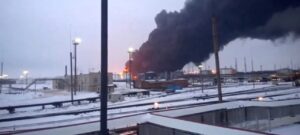
Attack on “Russia’s Achilles Heel”
In the days leading up to the presidential election in Russia, Ukraine surprises with a series of drone attacks targeting sites in the Russian mainland. Could this signal a new phase of the war? It looks like a small dot in the sky, moving remarkably slowly from left to right in videos circulating online, before erupting into a ball of fire. This is one of three Ukrainian drones presumed to have struck and exploded on the grounds of the Russian oil refinery in Ryazan within a short period.
Ryazan is not just any refinery; it is one of the largest in Russia. It is located far from the Ukrainian border, southeast of Moscow. Moreover, Ryazan is not the only target hit by Ukrainian drones in Russia since Tuesday night. According to calculations by the news agency Bloomberg, the refineries under attack account for at least twelve percent of Russia’s oil processing. While the extent of damages to fuel production remains uncertain, the sale of oil is said to be Russia’s Achilles’ heel, explains military economist Markus Keupp: “Nothing hurts Russia as much as a decline in oil production. The Russian state finances itself to over 50 percent from oil and gas sales revenue and is now heavily dependent on producing oil due to the sanctions.”
Uncomfortable Questions for Putin
However, Keupp points out that the recent attacks carry more than just economic repercussions. “If you watch the videos: These drones are relatively large, flying quite slowly, and can be easily observed. And yet, they simply fly into the refinery.” This raises the “legitimate question of what the Russian air defense is doing.”
This question is certainly unwelcome for the Kremlin so close to the election. It’s not just refineries burning in Russia for several days but also an airport, fuel depots, and government buildings.
Moreover, since Tuesday night, Russian forces have seemingly failed to prevent heavily armed Kremlin-opposing militias fighting on Ukraine’s side from infiltrating Russia. The fighters claim to occupy parts of the Russian border regions around Belgorod and Kursk. Russia asserts that the militias have been successfully fought off. The situation on the ground cannot be independently verified.
Colonel Markus Reisner, an Austrian military expert, sees a pattern in this. Similar incursions of such militias into Russian territory have occurred in the past, usually following Ukrainian setbacks. Reisner refers to “a very targeted method of warfare in the information space to divert the observer’s attention in a certain direction,” away from their own losses, such as the recent case of Avdiivka.
Russian Offensive Halted?
Since this week, Ukrainian President Volodymyr Zelenskyy has also attempted to offer a new perspective on the war. In a French television interview on Monday, he stated that the Russian advance has been “halted.” The situation on the frontlines is reportedly better than in the past three months.
Colonel Reisner predicts that there will unlikely be major Russian advances in the coming weeks. However, this is not due to shifting power dynamics but because Zelenskyy understands that “the Rasputitsa is on the doorstep,” referring to the muddy season when movements with “heavy equipment” are difficult.
New Phase, Not a Turning Point
Military economist Keupp notes that Ukraine has evidently received isolated ammunition deliveries again and “still has reserves” that it has utilized to stabilize parts of the front.
Perhaps this marks a new phase in the war, but it is not a turning point. Experts Reisner and Keupp anticipate that this conflict will remain a war of attrition for a long time. Despite both sides preferring success stories, especially now just before the Russian election.
Against this backdrop, Colonel Reisner believes that the recent drone attacks were just the beginning: “I think in the next few days, we will see some more spectacular surprises.”